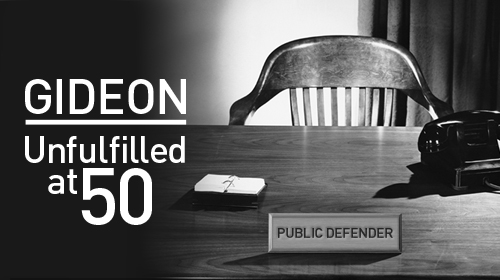
"You can only protect your liberties in this world by protecting the other man's freedom."
Clarence Darrow, 1920
Yesterday, we honored the 50th anniversary of the landmark Supreme Court case Gideon v Wainwright, in which the high Court held that a poor person facing criminal charges is entitled to counsel at the expense of the state. Fifty years after this decision, 80% of criminal defendants nationwide cannot afford their own lawyer. It's time to take stock of what we need to do going forward, as our Constitutional imperative to provide an adequate defense to those in need remains as pressing as ever.
In the 50 years since the Gideon decision, we have certainly made some strides – but do not be fooled. Yes, an indigent defendant's right to counsel has now been expanded to cover not only felony trials, but , , , , charged with a juvenile offense, and of adversarial judicial proceedings. But, 50 years later, the true promise of Gideon is far from being fulfilled. The right to counsel has been twisted and shredded in many jurisdictions across the country so as to have become almost unrecognizable.
Like many other in the necessity of this work, I did not become a criminal defense lawyer to get ensnared in a system that disrespects us and our clients so completely. Instead, we seek to trumpet the "" that the average defendant stands little chance without a well-resourced, experienced defense attorney next to her. We have specialized skills and abilities to match our commitment to justice – we must insist the right to counsel mean what the Supreme Court has said it means.
Too often, though, a severe lack of resources and time test our commitment to provide public defense:
- In Idaho, appointed defense lawyers across the state in any of the 44 different county structures are overworked and underpaid, carrying hundreds more cases than national caseload standards contemplate, and forcing defense attorneys to "meet ‘em and plead ‘em" at a record pace.
- In New York, defense counsel are paid far less than prosecutors on the other side of the table who do the same, or less, work.
- In , lawyers without specialized training and knowledge of complicated cases are assigned to represent those clients anyway.
- In Pennsylvania, the state does not provide a dime to fund indigent defense and no one oversees the quality of counsel individuals receive – recall the juvenile court judge who traded "" with a for-profit juvenile facility builder.
- In Missouri, a divorcing couple represented a capital defendant where the prosecutor edited police reports to match the confession beat out of the defendant, and the .
- In Utah, an individual charged with shoplifting a loaf of bread may receive appointed counsel in one county but not the other.
- In Alabama, the small town judge who presides over a criminal case appoints defense counsel to represent the indigent and can refuse to appoint the same lawyer to subsequent cases if the lawyer "too zealously" represents her client. This system creates a conflict of interest – the defense counsel faces the dilemma of ensuring his livelihood or honoring the defendant's constitutional rights.
- In completing its investigation, was shocked to learn how little information was available about where state money goes in Michigan's 83 different public defense delivery systems.
Most, if not all, of these phenomena are likely occurring somewhere in your state too. have statewide public defender systems and most of those are fraught with under-funding issues – and the balance of the country is a free-for-all.
All of this leaves the client out in the cold – and a frigid day it is. Prison sentences are 636% (seven times) higher now than in 1963, when Clarence Gideon was sentenced to 2 years for stealing drinks and some cash from a pool hall. Today, . There are more Black people in prison today than were enslaved in this country in 1850. In fact, to this day, African Americans are incarcerated at nearly .
In private cases, clients pay hundreds of dollars an hour for a lawyer to defend them. Do the lives and liberty of disproportionately Black and brown people matter that much less?
We all believe in the Constitution – how about we start applying it properly to criminal defendants? Nationally, we have had several hundred exonerations, including from death row. That should at least give us pause, if not compel us to completely revamp the system to prevent such horrendous mistakes from occurring.
There, but for the grace of God, go I … or you. Wouldn't you rather have a properly paid, well-trained, prepared, willing, and resourced lawyer in your corner?
Stay tuned over the next year as we share more stories about the current state of indigent defense, fifty years after Gideon v. Wainwright.
Learn more about criminal law reform and other civil liberty issues: Sign up for breaking news alerts, , and .


